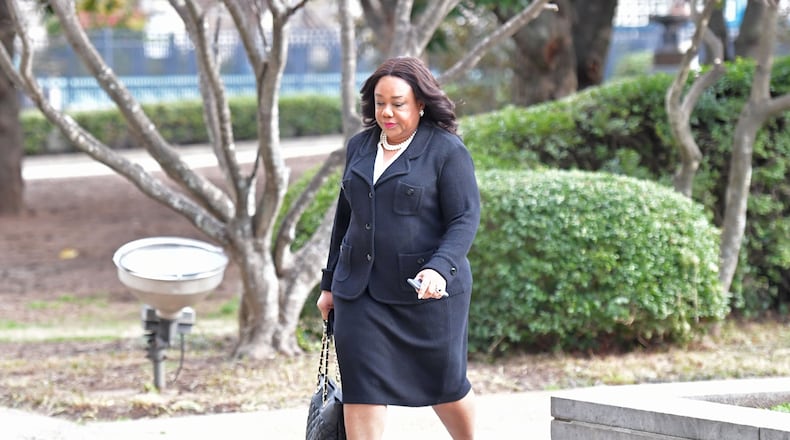Former DeKalb County Commissioner Sharon Barnes Sutton’s recent criminal conviction — and likely stint in federal prison — does not mean long-standing local ethics complaints against her will disappear.
Elisa Murphy, who took over as DeKalb’s new ethics officer last month, said her office will continue to pursue previously initiated cases, against Barnes Sutton and otherwise.
“We owe that to the citizens of DeKalb County,” she wrote in an email to The Atlanta Journal-Constitution.
A federal jury on Wednesday found Barnes Sutton guilty of two counts of extortion, charges stemming from a 2014 situation in which she solicited monthly $500 payments from a county contractor. The former commissioner ultimately received $1,000 from Reginald Veasley before the FBI intervened.
Around the same time all that was going on, community activists were also filing complaints regarding Barnes Sutton with the local ethics board, an oversight panel that has the power to reprimand, censure and fine county officials and employees.
A total of four ethics complaints filed between 2014 and 2016 accuse the former commissioner of, among other things, misusing her county purchasing card; using county employees to help her reelection campaign; not recusing herself from contract talks involving a business owner with whom she was reportedly in a relationship; and improperly accepting “in-kind memberships” to a local YMCA.
Despite the time that has passed, all but one of the complaints is still pending — for a number of reasons.
Amid the allegations, Barnes Sutton and attorney Dwight Thomas filed a lawsuit challenging the constitutionality of the ethics board and the way certain members were appointed. A 2018 ruling from the Georgia Supreme Court took their side and ultimately rendered the ethics board dormant for nearly three years.
A new version of the ethics board was reassembled in early 2021. A hearing on two of the outstanding Barnes Sutton cases was scheduled for November of last year, but it was ultimately delayed pending the completion of her criminal trial.
Asked last week if the ethics office should continue to pursue cases against Barnes Sutton, Thomas said it “depends on whether the board wants to incur additional costs for a matter that old.”
He said he was “prepared to litigate several issues” related to the ethics matters and, while he does not represent Barnes Sutton in her criminal case, suggested that recent verdict would be appealed as well.
“There will not be any federal finality for almost two years due to the appellate process,” Thomas said.
Sentencing in Barnes Sutton’s criminal case was originally set for early January, but court filings show it has since been moved to Feb. 14. It was not immediately clear why the hearing was rescheduled.
The former commissioner faces a maximum of 20 years in prison but her sentence is likely to be significantly less.
About the Author
Keep Reading
The Latest
Featured



